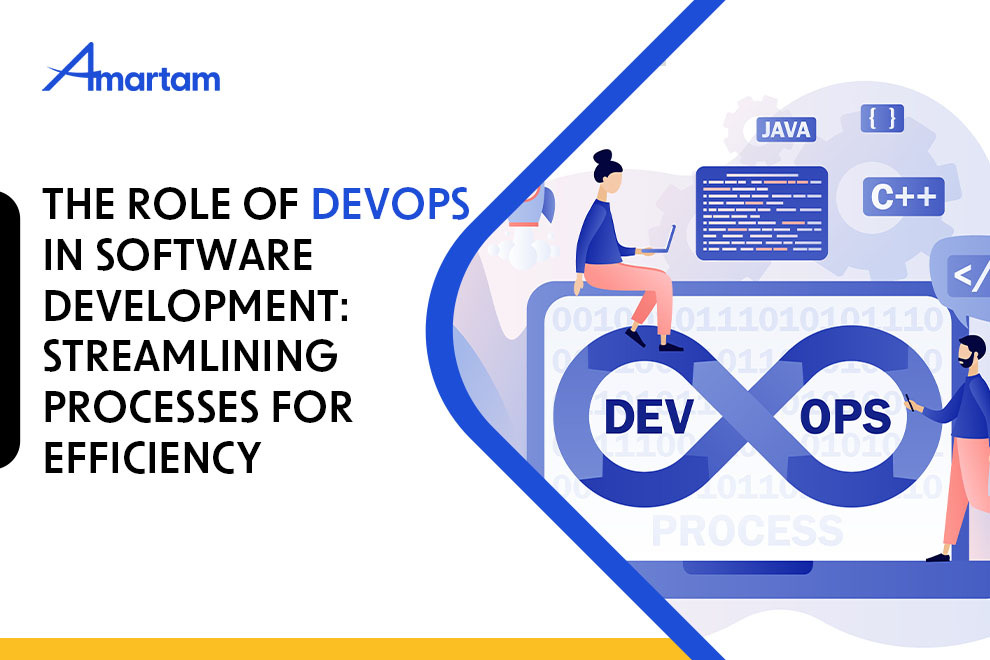
Introduction
When faced with the challenges of modern living, every major web software development company and eCommerce sector has turned to DevOps. The number of businesses that have adopted a DevOps strategy has been increasing over the last several years, we’ve seen. You can’t exaggerate the importance of this phase because this methodology is so crucial for making application development easier.
“Development and Operations” is the abbreviation for “DevOps.” Herein lies the essence of the term “DevOps.” What we mean when we speak about it is a set of practices that includes both software development services and IT management.
The objective of this piece is to take a look at how DevOps might help organizations achieve their objectives more efficiently by refining the application development process. The next paragraphs will examine both of these points.
Understanding DevOps
In this method of developing software, which places an emphasis on transparency and collaboration, programmers and other personnel with expertise in information technology work closely together. This approach aims to expedite time-to-market, boost dependability, improve agility, and minimize costs by expanding upon standard software development services and operations methods. This approach aims to achieve the following. With the support of DevOps development services, software application testing, public release, and development may all be automated and improved.
As a component of the DevOps movement, the traditionally existing barriers between the operations and development teams are being eliminated. To get there, we need to figure out how to work together, where we can both agree.
A more effective, efficient, and agile web software development lifecycle is the outcome of the two groups’ improved cooperation, coordination, and communication. An essential part of development operations (DevOps) is automating a lot of procedures all through the software development lifecycle. Automating common processes like code integration, testing, and deployment is one way in which DevOps helps teams at web software development companies.
Exploring the Advantages of DevOps for Application Development Efficiency
The next step is to figure out why DevOps is becoming more popular and how it may simplify application development. There isn’t just one perk; rather, there are several that make it easier and faster for developers to create, test, and release apps.
How about we investigate them?
- DevOps relies heavily on automation, which cuts down on labor-intensive manual operations in areas like managing configurations, testing, execution, and monitoring.
- By streamlining delivery processes and eliminating manual chores, DevOps contributes to cost savings. Companies can cut costs by not staffing the development cycle with more individuals.
- DevOps engineers consistently test applications at every stage of development by following QA best practices. Improved code quality and speedy bug fixes are both ensured by this method.
- The main role of DevOps is to promote team communication by facilitating cross-functional cooperation across many departments, such as engineering, operations, and support. This will ensure that all parties are communicating effectively throughout the app’s development.
- By supporting businesses in automating more of their operations and eliminating manual, labor-intensive tasks, DevOps may enhance time-to-market and decrease lead times.
- The increased security that comes with a DevOps mentality is one of the biggest benefits. Application security can be improved with the help of DevOps engineers by integrating best practices for web development software with security into their workflows.
You may improve your systems and processes even further with the help of a professional DevOps development company, leading to even higher cost savings.
Technologies and Tools for DevOps That Simplify Application Development
The well-known DevOps methodology is now standard procedure for creating software. The application development process can be made more efficient with its help.
Development services for DevOps typically make use of the following tools and technologies:
- To keep the production environment constant across all servers, configuration management technologies are a lifesaver. Popular examples include Ansible, Chef, and Puppet. Because of this, updating the app with new features or fixing bugs is less of a hassle and won’t impact other areas as much.
- Continuous deployment and delivery can be achieved by automating the process of merging several developers’ modifications into a single code version using platforms such as GitHub and BitBucket. This ensures that all changes are carefully considered and put into action without delay.
- Developers may quickly run tests on code just before it’s sent to production using technologies like Travis CI, CircleCI, and Jenkins. This aids in discovering errors early in the design process, when they can be more easily fixed and prevented from becoming more significant issues later on.
- Application performance may be seen in real-time with the help of monitoring and logging tools like Splunk and New Relic. As a result, problems with performance or outages can be more easily detected and addressed.
As a result of utilizing test automation, managing configurations, continuous integration and their delivery, monitoring, and logging, teams have the ability to develop applications that are of a higher quality and include fewer errors. From the level of ideation to the stage of production, they are able to move more rapidly as a result of this. You should now have a better grasp of how the role of DevOps in simplifying the creation of applications may make the procedure quicker, more efficient, and less risky. This understanding stems from the information that was presented above. The provision of the tools and technologies that are essential for more effective collaboration is the means by which this objective is attained.
Implementing DevOps in Application Development
The DevOps market is projected to increase at a CAGR of more than 20% from 2020 to 2026, according to a study by strongdm.
In order to simplify application development, more and more people are adopting the DevOps approach. An efficient and well-designed DevOps strategy is required to make the most of the possible advantages. Following a few best practices is essential while utilizing DevOps in application development:
- Due to the fact that it reduces the need for manual duties, automating is one of the most essential elements of the DevOps process. Methods that are examples of automated processes include the principles of testing, tracking, and deployment. Among the automation tools that can be deployed to help the acceleration of app development and the simplification of the release process are Ansible, Jenkins, and Chef. These are just a few examples.
- The key to a successful DevOps implementation is collaboration, thus it’s important to foster it. This is due to the fact that accomplishing this objective requires collaboration amongst designers, operators, and other interested parties. One of the most efficient strategies to guarantee that all of the tasks will be completed on time and within the allocated budget is to keep communication lines open and collaborative.
- Containers are an ideal tool for accomplishing these objectives for a variety of reasons, and they may be used to simplify and scale up the process of developing products. This can be accomplished by utilizing containers. Using containers, which make it possible to enclose applications within a self-contained environment, simplifies the process of distributing and handling programs. Another benefit of using containers is that they make it feasible to cut down on the amount of time spent on these operations.
- If you want to make sure that the DevOps tactics are working, you need to keep a close eye on the process. As part of this process, you will keep an eye on the application’s performance, resource consumption, and other data. The goal at every step of this procedure is to identify areas that could use improvement and any bottlenecks.
- The adoption of cloud computing provides a variety of benefits to its users. When it comes to DevOps projects, cloud computing has the potential to offer both flexibility and scalability. This is something that should be taken into consideration. Because to cloud-based solutions like Amazon Web Services (AWS), Microsoft Azure, and Google Cloud Platform (GCP), businesses are able to deploy applications across a wide range of environments in a very short amount of time. This is made possible by the cloud. Cloud computing is where these solutions are stored.
The use of DevOps in application development can be accomplished through the use of these strategies, which are among the most effective. The function of DevOps consulting services, on the other hand, should not be underestimated because they have the potential to provide you with guidance and information throughout the process. These are the kinds of things that consulting services can provide for you.
Final Thoughts
Web development software that is both efficient and of high quality must use DevOps practices. In the context of creating apps, this is especially the case. Developers can work together more effectively, identify problems sooner, and provide goods to the market more quickly as a result.
Organizations can reap the benefits of reduced app design and delivery costs and faster development timetables by integrating their operations and development teams.
Software development services may flourish in an organization that prioritizes DevOps. Companies can maximize their DevOps efforts by staffing up with engineers who are well-versed in the methodology and technologies required to implement effective initiatives.

